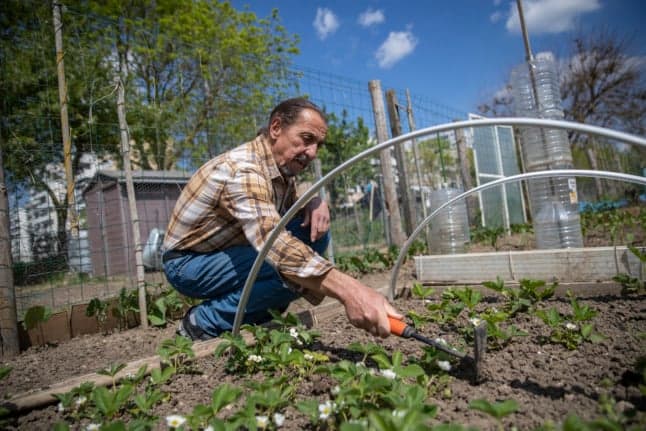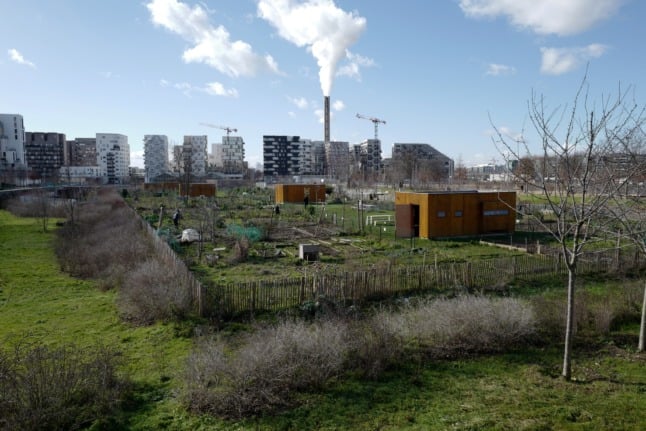How you can get a garden in France if you live in a city

The Covid pandemic has left lots of people in France craving outside space and the chance to grow their own food, but not everybody can move to the countryside and buy a house with a garden.
If your priority is growing your own fruit and veg, allotments are fairly common in large French cities.
Known as jardins familiaux (family gardens) in French -although they are sometimes still referred to by their former name of jardins ouvriers (workers' gardens) - the plot of land is assigned to an individual or family who can use it for what they like - growing their own fruit and veg, creating a beautiful outdoor space or even attempting small-scale grape wine production.
How to get an allotment
Allotments are usually open to anybody who lives in the city and does not have a garden of their own. The cost can be anything from €10 to around €50 per year, and there are a certain number of rules to respect.
You can submit an application to the town hall. The process will differ from city to city, with some local authorities allowing applications by email and others requiring a paper copy.
You will usually be asked to provide ID and proof of address, and may also need to write a short letter explaining either your reasons for wanting an allotment or any preferences or requirements you may have in terms of size, accessibility or neighbourhood.
READ ALSO Five poisonous plants that might be in your French garden
Once your application has been processed, you will be added to the waiting list, and now you will need to have some patience, because it can be several years before a plot becomes available.
And requests for allotments have unsurprisingly shot up since the beginning of the Covid pandemic,
"Before Covid-19, we must have had 1,000 requests waiting. That number has exploded, and today we have 1,800 people waiting for a plot. You now have to wait at least 4 or 5 years to be given one," Philippe Bambis, head of the community gardens department at Strasbourg city hall told 20 Minutes in March.
You can consult your local town hall to know how long you are likely to have to wait.

People work in a community garden in Saint-Ouen, northern suburbs of Paris. Photo: Ludovic MARIN / AFP.
Other possibilities
There are many reasons why you might want a garden but are hesitant to apply for an allotment. Maybe you don't fancy spending years on the waiting list, or don't have the time to commit to growing everything yourself. Or maybe you see gardening as a collective activity.
Fortunately, there is another option: the jardin partagé. These are communal gardens which are collectively maintained by the local community. Residents run the gardens through associations, and they are meant to work as spaces where people can meet and build connections, so they're a great way to integrate into the local community.
And their scope often goes beyond simply cultivating fruit and vegetables. France's ecology ministry defines a jardin partagé as: "gardens created or kept going collectively, with the goal of developing social cohesion through social, cultural or educational activities, while being accessible to the public".
READ ALSO Champs-Elysees to be transformed into ‘extraordinary garden’
If you live near a community garden, all you have to do is get in touch with the association that runs it. If you live in Paris, you can find a map of the capital's community gardens, with contact details for the different associations, here. Similar maps are available for many cities. Of course, you can also head straight to the garden and get in touch with the association if one of its members happens to be there at the time.
You may have to pay a small fee to become a member of the association in order to use the gardens, and unfortunately there may also be a waiting list, as communal gardens have also seen a rise in popularity in recent years.
Comments
See Also
If your priority is growing your own fruit and veg, allotments are fairly common in large French cities.
Known as jardins familiaux (family gardens) in French -although they are sometimes still referred to by their former name of jardins ouvriers (workers' gardens) - the plot of land is assigned to an individual or family who can use it for what they like - growing their own fruit and veg, creating a beautiful outdoor space or even attempting small-scale grape wine production.
How to get an allotment
Allotments are usually open to anybody who lives in the city and does not have a garden of their own. The cost can be anything from €10 to around €50 per year, and there are a certain number of rules to respect.
You can submit an application to the town hall. The process will differ from city to city, with some local authorities allowing applications by email and others requiring a paper copy.
You will usually be asked to provide ID and proof of address, and may also need to write a short letter explaining either your reasons for wanting an allotment or any preferences or requirements you may have in terms of size, accessibility or neighbourhood.
READ ALSO Five poisonous plants that might be in your French garden
Once your application has been processed, you will be added to the waiting list, and now you will need to have some patience, because it can be several years before a plot becomes available.
And requests for allotments have unsurprisingly shot up since the beginning of the Covid pandemic,
"Before Covid-19, we must have had 1,000 requests waiting. That number has exploded, and today we have 1,800 people waiting for a plot. You now have to wait at least 4 or 5 years to be given one," Philippe Bambis, head of the community gardens department at Strasbourg city hall told 20 Minutes in March.
You can consult your local town hall to know how long you are likely to have to wait.

Other possibilities
There are many reasons why you might want a garden but are hesitant to apply for an allotment. Maybe you don't fancy spending years on the waiting list, or don't have the time to commit to growing everything yourself. Or maybe you see gardening as a collective activity.
Fortunately, there is another option: the jardin partagé. These are communal gardens which are collectively maintained by the local community. Residents run the gardens through associations, and they are meant to work as spaces where people can meet and build connections, so they're a great way to integrate into the local community.
And their scope often goes beyond simply cultivating fruit and vegetables. France's ecology ministry defines a jardin partagé as: "gardens created or kept going collectively, with the goal of developing social cohesion through social, cultural or educational activities, while being accessible to the public".
READ ALSO Champs-Elysees to be transformed into ‘extraordinary garden’
If you live near a community garden, all you have to do is get in touch with the association that runs it. If you live in Paris, you can find a map of the capital's community gardens, with contact details for the different associations, here. Similar maps are available for many cities. Of course, you can also head straight to the garden and get in touch with the association if one of its members happens to be there at the time.
You may have to pay a small fee to become a member of the association in order to use the gardens, and unfortunately there may also be a waiting list, as communal gardens have also seen a rise in popularity in recent years.
Join the conversation in our comments section below. Share your own views and experience and if you have a question or suggestion for our journalists then email us at [email protected].
Please keep comments civil, constructive and on topic – and make sure to read our terms of use before getting involved.
Please log in here to leave a comment.